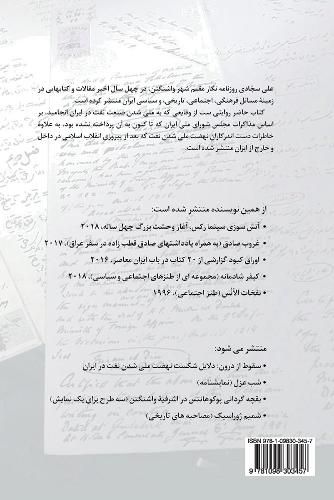Readings Newsletter
Become a Readings Member to make your shopping experience even easier.
Sign in or sign up for free!
You’re not far away from qualifying for FREE standard shipping within Australia
You’ve qualified for FREE standard shipping within Australia
The cart is loading…






There are many books and articles published about Iranian movements for oil nationalization from 1950-1953; however, in the last 70 years, no one has looked into Iranian parliament negotiations regarding the nationalization of oil. As a matter of fact, many of these negotiations were not published till after Islamic revolution in the mid 1980’s. Almost all memories of leaders of nationalization of oil in Iran were also published after 1980, and for different reasons, no one has sought to come up with a more comprehensive narration of Iranian oil nationalization. This book focuses on Majlis (Iranian Parliament) negotiations on oil from 1950-1951, and aims to shed light on the darkness of the Iranian movement. The chapters of this book are organized as follows:
Chapter 1: Presents the history of oil negotiations in Majlis after Iran was occupied in 1943 by UK and Soviet and Reza shah exiled.
Chapter 2: Discusses Soviet demands of Iranian oil in northern parts of Iran and how Iran and Majlis played their hands.
Chapter 3: Draws a comparison between Iran’s concessions of 1901 to William N. D'Arcy and Anglo-Iranian Oil Company treaty in 1933. Mossadegh claims D'Arcy concession was a better contract and the 1933 treaty was imposed to Iran.
Chapter 4: Examines negotiations of Oil Committee in 16th Majlis and clashes between Prime Minister Razmara and Leader of Committee Mossadegh.
Chapter 5: Looks into the assassination of Prime Minister Razmara and possible roles of nationalization seekers in the assassinations of their opponents.
Chapter 6: Discusses Nationalization and examines whether there were other ways to nationalize oil, and why the Nationalization of oil never was negotiated in the floor of parliament.
Chapter 7: Investigates Subordinated companies of Anglo-Iranian Oil company . Iran was subjected to 16 to 20 percent of net profit of those companies; however, leaders of the nationalization of oil lost because they did not include it into the negotiations in Majlis, or in their law of Nationalization . Some experts claim there were more than 90 of those companies. A list of 46 of them are included in this chapter.
Chapter 8: Explains the House of Richard Seddon in Tehran. Seddon was head of Anglo-Iranian Oil Company in Tehran and his house was attacked and seized by Pro-Mossadegh group in spring of 1951. Selected documents attributed to Seddon house were published against oppositions of nationalization of oil. This documents also shows that Mossadegh used a so-called tack two diplomacy and had people in oil company and offices of Prime Mister Razmara to report to him news and developments.
Chapter 9: Looks into the logic of ruling of International Court of Justice in Hague in favor of Iran.
$9.00 standard shipping within Australia
FREE standard shipping within Australia for orders over $100.00
Express & International shipping calculated at checkout
There are many books and articles published about Iranian movements for oil nationalization from 1950-1953; however, in the last 70 years, no one has looked into Iranian parliament negotiations regarding the nationalization of oil. As a matter of fact, many of these negotiations were not published till after Islamic revolution in the mid 1980’s. Almost all memories of leaders of nationalization of oil in Iran were also published after 1980, and for different reasons, no one has sought to come up with a more comprehensive narration of Iranian oil nationalization. This book focuses on Majlis (Iranian Parliament) negotiations on oil from 1950-1951, and aims to shed light on the darkness of the Iranian movement. The chapters of this book are organized as follows:
Chapter 1: Presents the history of oil negotiations in Majlis after Iran was occupied in 1943 by UK and Soviet and Reza shah exiled.
Chapter 2: Discusses Soviet demands of Iranian oil in northern parts of Iran and how Iran and Majlis played their hands.
Chapter 3: Draws a comparison between Iran’s concessions of 1901 to William N. D'Arcy and Anglo-Iranian Oil Company treaty in 1933. Mossadegh claims D'Arcy concession was a better contract and the 1933 treaty was imposed to Iran.
Chapter 4: Examines negotiations of Oil Committee in 16th Majlis and clashes between Prime Minister Razmara and Leader of Committee Mossadegh.
Chapter 5: Looks into the assassination of Prime Minister Razmara and possible roles of nationalization seekers in the assassinations of their opponents.
Chapter 6: Discusses Nationalization and examines whether there were other ways to nationalize oil, and why the Nationalization of oil never was negotiated in the floor of parliament.
Chapter 7: Investigates Subordinated companies of Anglo-Iranian Oil company . Iran was subjected to 16 to 20 percent of net profit of those companies; however, leaders of the nationalization of oil lost because they did not include it into the negotiations in Majlis, or in their law of Nationalization . Some experts claim there were more than 90 of those companies. A list of 46 of them are included in this chapter.
Chapter 8: Explains the House of Richard Seddon in Tehran. Seddon was head of Anglo-Iranian Oil Company in Tehran and his house was attacked and seized by Pro-Mossadegh group in spring of 1951. Selected documents attributed to Seddon house were published against oppositions of nationalization of oil. This documents also shows that Mossadegh used a so-called tack two diplomacy and had people in oil company and offices of Prime Mister Razmara to report to him news and developments.
Chapter 9: Looks into the logic of ruling of International Court of Justice in Hague in favor of Iran.